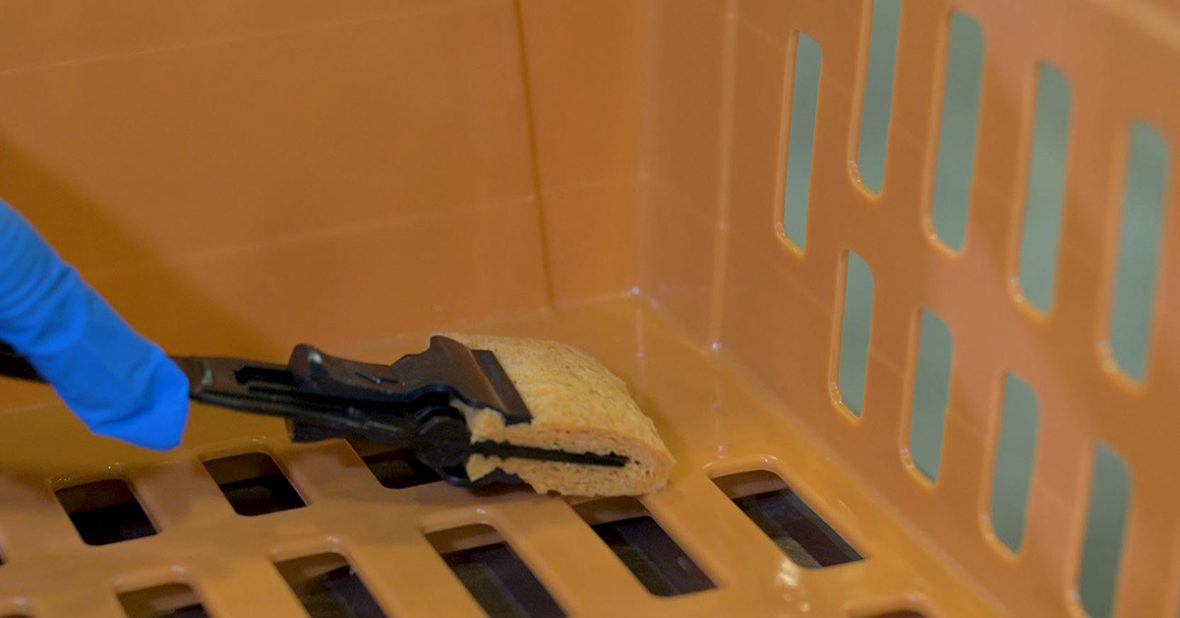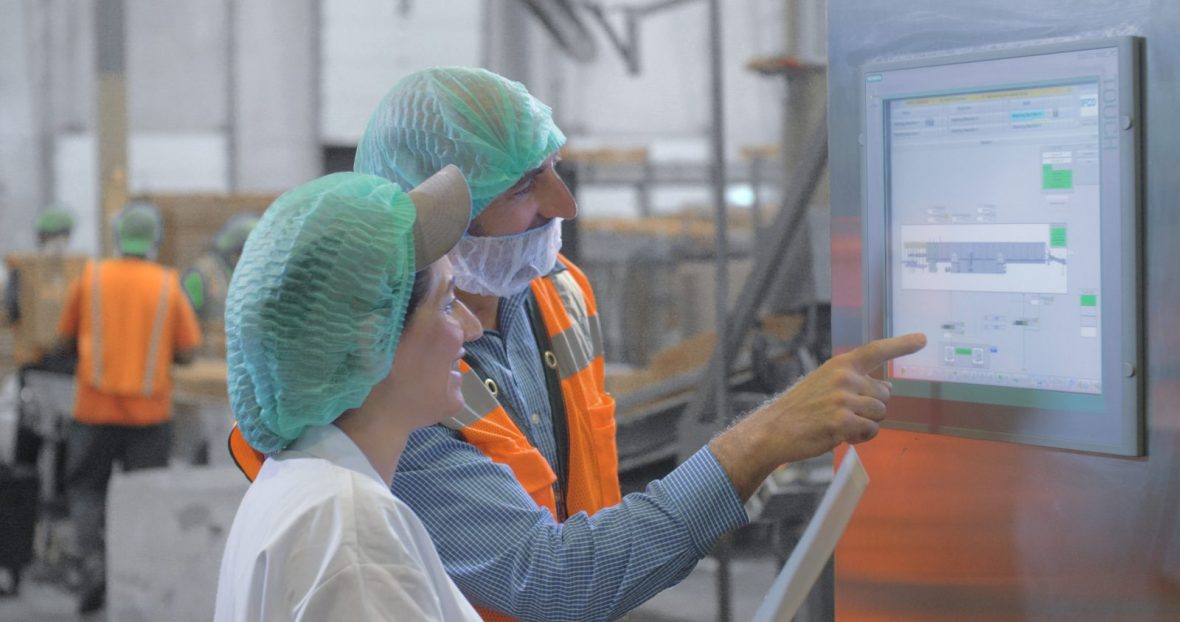Sanitized IFCO RPCs can be used without concern. Thanks to our rigorous testing and hygiene processes, IFCO RPCs are as safe as new containers.
If you want to know whether a reusable packaging container (RPC) is truly clean, check its inside corners. This is because dirt, residue, or pulp from fruits and vegetables can become wedged in the crate’s corners – the corners are the most difficult areas to clean. So this is one of the areas where IFCO performs inspection and swabbing as part of the quality assurance process. During the cleaning process, following the pre-wash, wash, rinse, and sanitize steps, IFCO dries the crates with centrifugal force. This whirling action pushes water droplets outward, removing 99 percent of the moisture, and pushing any remaining moisture to the corners of the RPC.
"Inside corners are critically important in IFCO RPC hygiene tests," explains Jeff Mitchell, Director of Food Safety at IFCO, and talks about a testing incident. During a client visit to an IFCO wash center, he says, a customer picked up a clean RPC with his bare hands, which is against IFCO protocol. Mitchell took this as an opportunity to show the effectiveness of the swabbing and wash process. Where the visitor had touched the RPC, an adenosine triphosphate (ATP) swab was performed. This is because ATP is an energy-carrying molecule found in all living cells, so the test is used to detect the presence of microorganisms. The customer was surprised to see that the ATP swab showed a failing result – in other words, ATP was found on the handled surface. "We swabbed the same RPC in the corners and the results were zero, acceptable."

Mitchell’s anecdote underlines IFCO’s commitment to food safety through rigorous testing and hygiene. It starts with IFCO RPCs, which are designed and constructed of durable food-grade polypropylene that can be effectively washed and sanitized. Every IFCO RPC is cleaned accordingly to certified processes and strictly enforced hygiene standards that are the same globally.
Pathogens that might be found in the food supply chain, including a broad spectrum of bacteria, viruses, yeast and molds, do not stand a chance against the antimicrobial detergents and disinfectants used in the IFCO wash process. In addition, IFCO’s global sanitation partner has provided a guarantee that clean IFCO RPCs are safe for reuse. This guarantee includes the killing and removal of both human and plant pathogens. "Following washing, drying and inspection, the surfaces of RPCs leaving the facility for reuse are as safe as a newly manufactured, first-time use RPC or a single-use packaging container," emphasizes Mitchell.
During the washing and sanitizing processes, IFCO’s proprietary SmartGuardian™ digital software system monitors our key wash metrics. It stops the wash process if any process metric is operating at a sub-optimal level. This digital system then provides a daily shift report of the operations, with details of the wash temperature and detergent, and disinfectant flow in the system.
IFCO RPC clients then receive a supplier verification package that summarizes the food safety program’s key elements, including the environmental monitoring program overview and third-party audit results. A label on the pallet certifies that crates in the stack have passed all IFCO washing and sanitation requirements. "Each IFCO wash machine is 100 percent monitored and our process is verified," emphasizes Mitchell. "In quality assurance, the motto ‘trust but verify’ is common. In other words, we trust our machines and cleaning processes absolutely, but we also verify their effectiveness through swabbing."
“In more than 25 years of pooling operations, no cases of transmission of plant viruses from IFCO RPCs have ever been documented. ”
Following washing and sanitation of the RPCs, IFCO and independent food safety experts routinely perform on-site swab testing and take samples for lab tests – to verify the absence of indicator organisms and to validate the processes.
"It doesn’t matter whether a test would reveal traces of bacteria or of other organic materials, because we want to remove them all." – Jeff Mitchell, Director Food Safety at IFCO
Mitchell explains the procedure: "We take a zonal approach. We swab Zone 1 – the food-contact surface of the crate – looking for indicator organisms. This tells you whether the wash processes are effective. We also test Zone 2, which are equipment surfaces. In other words, we swab the wash facilities environment." The swab tests will indicate whether any of the microorganisms tested for are present. One further step is performing an ATP swab test. "It doesn’t matter whether a swab test would reveal traces of bacteria or of other organic materials, because we want to remove them all," says Mitchell.
The other reason for ATP tests, Mitchell explains, is that you sometimes have to wait 72 hours for the bacterial results of lab tests. ATP tests are instantaneous, which means that corrective action can be taken immediately. This stringent testing and validation pays off. In more than 25 years of pooling operations, no cases of transmission of plant viruses from IFCO RPCs have ever been documented.
The safe-use history along with process validation prove that there is no risk of transient human or plant pathogens on washed IFCO RPCs. IFCO RPCs are designed and manufactured to be effectively cleaned and sanitized. Following use, RPCs are collected by IFCO, then individually cleaned and sanitized. At IFCO, testing for hygiene is not restricted to the crates. To guarantee cleanliness, the wash machines also undergo rigorous controls.
"When you swab the RPC surfaces, and also wash equipment surfaces, you are verifying that these surfaces were effectively washed, rinsed and sanitized as well. This verification method provides a "snapshot" of process control and provides evidence that IFCO RPCs are safe for reuse." The surfaces – and particularly the corners – of IFCO RPCs, along with the wash machines, are swabbed either twice per shift, daily, weekly or quarterly, depending on the type of test.
"We perform 20,700 swabs per year at IFCO," says Mitchell. "As far as I know, this is done nowhere else in the packaging environment. As leaders among pooling providers, we ensure the highest level of hygiene and service, and we will continue to innovate and to develop processes to deliver the IFCO standard to our customers."

Stay up to date
Want the latest fresh food packaging industry knowledge delivered straight to your inbox? Subscribe to our newsletter and get the latest news, trends, articles and more!
